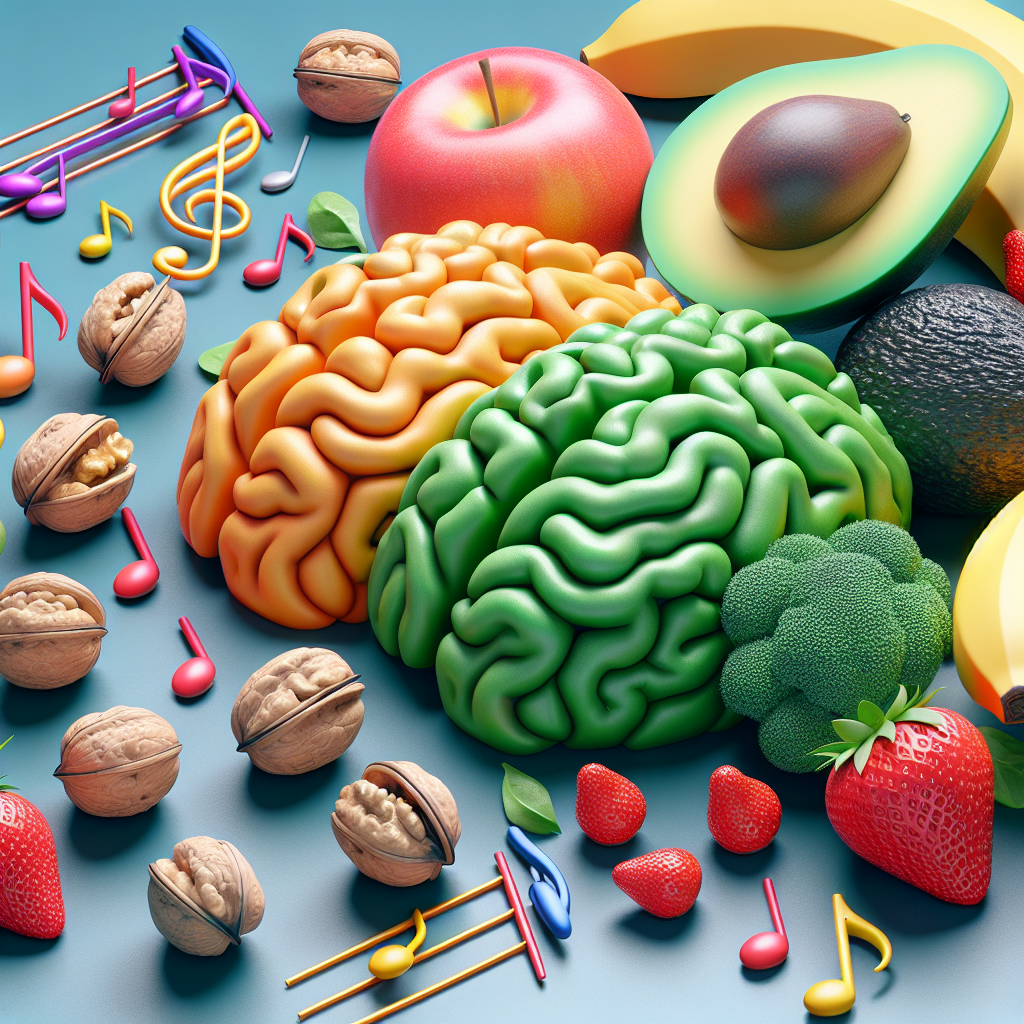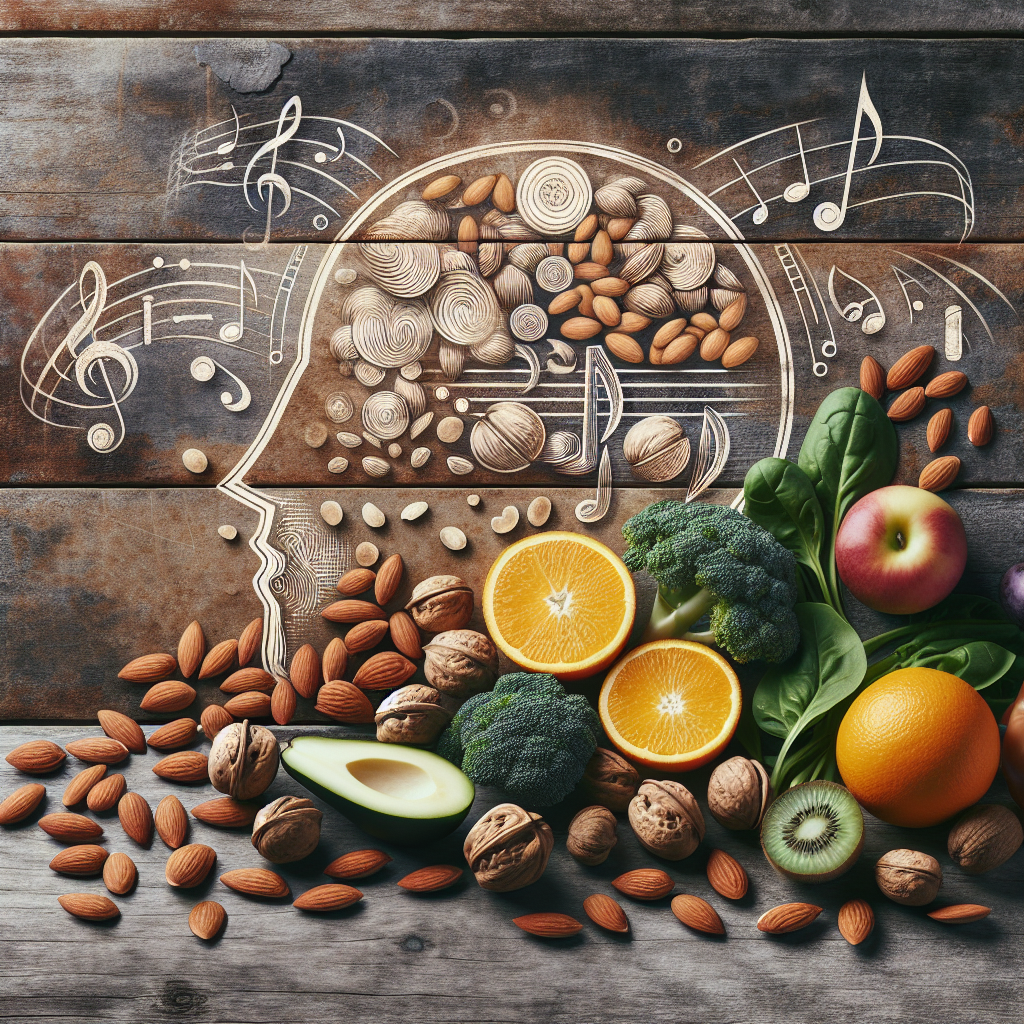Natural Vitamins that Support Mental Health for Musicians

Boost your mental health with our natural vitamins specially designed for musicians. Improve your focus, creativity, and overall well-being. Don’t wait, start your journey to a healthier mind today! Click here to learn more.
Exploring the Role of Natural Vitamins in Enhancing Musicians’ Mental Health
The mental health of musicians is a topic that has been gaining increasing attention in recent years. The unique pressures and demands of a career in music can often lead to stress, anxiety, and other mental health issues. However, there is a growing body of evidence suggesting that certain natural vitamins can play a significant role in supporting and enhancing mental health for musicians.
One of the most important vitamins for mental health is B-complex vitamins. These vitamins, which include B1, B2, B3, B5, B6, B7, B9, and B12, are essential for the proper functioning of the brain and nervous system. They help the body produce energy, create new blood cells, and maintain healthy skin cells, digestive tract cells, and nerve cells. A deficiency in any of these vitamins can lead to a range of mental health problems, including depression, anxiety, and even psychosis. For musicians, who often lead hectic and stressful lives, ensuring an adequate intake of B-complex vitamins can be crucial.
Vitamin D is another essential nutrient that can support mental health. Often referred to as the “sunshine vitamin,” vitamin D is produced by the body in response to sunlight. It is also found in certain foods, such as fatty fish and fortified dairy products. Vitamin D plays a key role in mood regulation and brain health. Research has shown that low levels of vitamin D are associated with an increased risk of depression. For musicians, who often spend long hours indoors practicing or recording, getting enough vitamin D can be a challenge. However, supplements can help to ensure that they get the necessary amount.
Omega-3 fatty acids, while not technically a vitamin, are another important nutrient for mental health. These fatty acids, which are found in fish, flaxseeds, and walnuts, are essential for brain health. They help to build and repair brain cells, and they also have anti-inflammatory properties that can protect the brain from damage. Studies have shown that people who consume a diet rich in omega-3 fatty acids have a lower risk of depression and anxiety. For musicians, incorporating these foods into their diet or taking omega-3 supplements can be a simple and effective way to support their mental health.
Finally, it’s worth mentioning the role of probiotics in mental health. Probiotics are beneficial bacteria that live in the gut and play a crucial role in digestion. However, recent research has shown that they also have a significant impact on the brain and can influence mood and behavior. This is often referred to as the “gut-brain axis.” For musicians, taking probiotic supplements or eating probiotic-rich foods, such as yogurt and fermented foods, can help to maintain a healthy gut and support mental health.
In conclusion, while the pressures and demands of a career in music can often lead to stress and other mental health issues, there are natural vitamins and nutrients that can help. B-complex vitamins, vitamin D, omega-3 fatty acids, and probiotics all play a crucial role in supporting and enhancing mental health. By ensuring an adequate intake of these nutrients, musicians can help to protect their mental health and maintain their creativity and performance levels.
The Impact of Essential Vitamins on Mental Wellness for Musicians

The world of music is a realm of intense creativity, passion, and dedication. However, it can also be a world of high stress, anxiety, and mental health challenges. Musicians, like any other professionals, need to take care of their mental health to maintain their creativity and productivity. One often overlooked aspect of mental health is the role of nutrition, particularly the impact of essential vitamins.
Vitamins play a crucial role in maintaining our overall health, including our mental well-being. They are involved in numerous biochemical reactions in the brain that affect our mood, stress levels, and cognitive function. For musicians, who often lead hectic and stressful lives, ensuring an adequate intake of these essential vitamins can be a game-changer for their mental health.
Vitamin B complex, for instance, is a group of eight vitamins that play a vital role in brain function. They help in the production of neurotransmitters, the chemicals that allow brain cells to communicate with each other. An imbalance in neurotransmitters can lead to mood disorders like depression and anxiety, common issues among musicians. B vitamins, particularly B6, B9, and B12, are also involved in the synthesis of serotonin, a neurotransmitter that regulates mood, sleep, and appetite.
Vitamin D, often referred to as the ‘sunshine vitamin’, is another essential nutrient for mental health. It is synthesized in the skin in response to sunlight and can also be obtained from certain foods. Research has shown a strong link between vitamin D deficiency and depression. For musicians who spend long hours indoors practicing or recording, getting enough sunlight and vitamin D can be a challenge.
Vitamin C, known for its immune-boosting properties, also plays a significant role in mental health. It is a powerful antioxidant that protects the brain against oxidative stress, a harmful process that can damage brain cells and has been linked to mental health disorders. Vitamin C also aids in the production of neurotransmitters like norepinephrine and serotonin, which are crucial for mood regulation.
Omega-3 fatty acids, although not a vitamin, deserve a special mention for their role in brain health. These essential fats are vital components of brain cells, helping to maintain their structure and function. They also have anti-inflammatory and antioxidant effects, which can protect the brain from damage and aging. Studies have shown that omega-3 supplementation can help reduce symptoms of depression and anxiety.
In conclusion, maintaining an adequate intake of these essential vitamins and nutrients can significantly support mental health for musicians. However, it’s important to remember that while vitamins can help maintain mental wellness, they are not a substitute for professional mental health treatment. If you’re a musician struggling with mental health issues, it’s crucial to seek help from a mental health professional.
Moreover, it’s always best to get vitamins from a balanced diet rich in fruits, vegetables, lean proteins, and healthy fats. However, if you’re unable to meet your nutritional needs through diet alone, consider taking a supplement after consulting with a healthcare provider. Remember, your mental health is just as important as your physical health, and taking care of it can help you hit the right notes in your musical journey.
Natural Vitamins: A Key to Mental Stability and Creativity for Musicians
Musicians, like any other professionals, face a myriad of challenges that can affect their mental health. The pressure to create, perform, and excel can be overwhelming, leading to stress, anxiety, and even depression. However, the good news is that there are natural vitamins that can support mental health for musicians, enhancing their stability and creativity.
Vitamin B complex, for instance, plays a crucial role in maintaining optimal brain function. This group of vitamins, which includes B1, B2, B3, B5, B6, B9, and B12, is essential for the production of neurotransmitters, the chemicals that transmit signals in the brain. A deficiency in any of these vitamins can lead to mood disorders, cognitive decline, and reduced creativity. Therefore, musicians should ensure they consume foods rich in these vitamins, such as whole grains, beans, peas, and lean meats.
Another essential vitamin for mental health is Vitamin D. Often referred to as the “sunshine vitamin,” it is produced by the body in response to sunlight. Vitamin D is vital for brain health, with research showing that it can help to alleviate symptoms of depression and anxiety. For musicians who spend much of their time indoors practicing or recording, it’s important to get outside and soak up some sun. Alternatively, they can include Vitamin D-rich foods in their diet, such as fatty fish, cheese, and egg yolks.
Vitamin C is also beneficial for mental health. It is a powerful antioxidant that protects the brain from oxidative stress, a condition that can lead to mental decline. Moreover, Vitamin C aids in the production of serotonin, a neurotransmitter that regulates mood, happiness, and anxiety. Musicians can get their daily dose of Vitamin C from fruits like oranges, strawberries, and kiwis, as well as vegetables like bell peppers and broccoli.
Omega-3 fatty acids, while not a vitamin, deserve a special mention. These essential fats are crucial for brain health, supporting memory, mood, and cognitive function. Studies have shown that people with low levels of Omega-3s are more likely to suffer from depression and anxiety. Musicians can boost their Omega-3 intake by consuming fatty fish, walnuts, flaxseeds, and chia seeds.
While these vitamins and nutrients can support mental health, it’s important to remember that they are not a cure-all. Musicians, like everyone else, should strive for a balanced diet, regular exercise, adequate sleep, and stress management techniques to maintain their mental health. Moreover, if symptoms of mental health disorders persist, it’s crucial to seek professional help.
In conclusion, the life of a musician can be demanding and stressful, but natural vitamins can provide a much-needed boost to mental health. By incorporating foods rich in Vitamin B complex, Vitamin D, Vitamin C, and Omega-3 fatty acids into their diet, musicians can enhance their mental stability and creativity. However, these should be part of a holistic approach to mental health that includes a balanced lifestyle and professional support when needed.